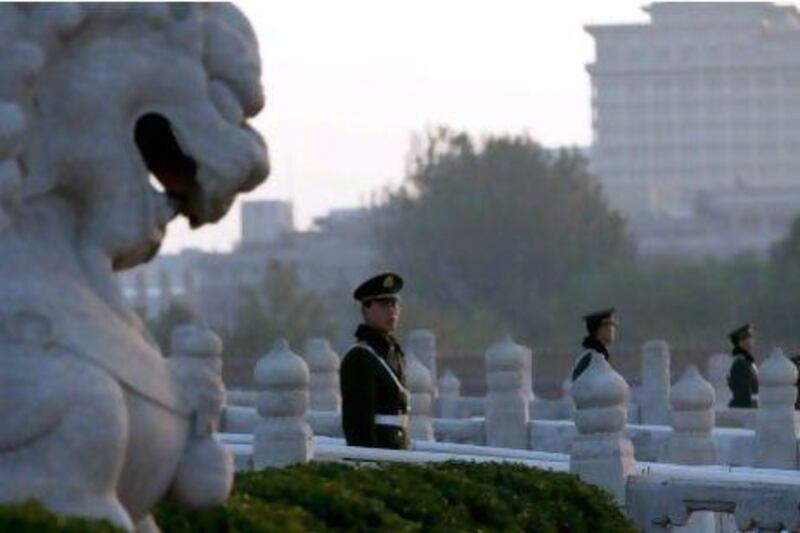BEIJING // In a narrow alley in central Beijing, Mr Liu sells meat and egg pancakes to people on their way to work. This week he was told to shut his shop by 9am, his busiest time.
One lane north, Mr Zhang has a business fixing shoes and repairing bicycles. He has been told to take down the large umbrella that shields him from the rain and to remove his display of soles and inner soles because they were deemed to be unsightly.
Police and urban enforcement officers stroll past every few minutes checking that traders comply with the new regulations.
On the street, a beggar is careful not to spend too long in one place, while Mr Zhang's wife warns a petitioner - a person who said he was seeking justice for his murdered son - to be careful.
"They are arresting people like you at the moment," she said.
This is Beijing on the eve of the 18th Party Congress - a roughly week-long meeting of 2,270 Communist Party delegates that begins tomorrow and ends with the unveiling of a new politburo standing committee - China's top governing body.
The reshuffle this year is the largest in a decade, with top leaders, including the party chief and president Hu Jintao, due to retire from their party posts and make way for a new generation of leaders, spearheaded by the current vice-president, Xi Jinping.
The congress is a largely cosmetic event - the new leaders having been chosen by the old ones in a series of secretive meetings over the course of the past few months - but it is a formality that China's ruling Communist Party does not want to see disrupted.
China has experienced a surge in violent protests over the past two years: about 60 Tibetans have self immolated over the issue of religious freedom, as have numerous Chinese farmers whose lands were confiscated by the state. Migrant workers have rioted over wage disputes and a recent government report pointed out that even the middle classes are disaffected: fed up with corruption, a rigid education system and massive environmental problems.
Last month, tens of thousands of urbanites protested against the expansion of a petrochemical plant in the city of Ningbo.
As a preventive measure, Beijing authorities have launched a massive security crackdown and embarked on a beautification drive during the congress.
The internet here has slowed noticeably in recent days and virtual private network services used to access sites banned in China - such as The New York Times - have also become unstable.
Taxi drivers have had to disable their rear passenger windows so that customers cannot throw pamphlets out after someone reportedly lobbed ping-pong balls containing a political message out of a moving vehicle.
Pigeon fanciers have been told to keep their flocks in their coops and even toy vendors have been instructed to discontinue the sale of remote-control helicopters for the next few weeks - presumably to stop them from being used to launch crude aerial attacks or carry out political stunts.
Knives have been removed from shop shelves and people are reporting difficulty in buying bricks.
To reduce the possibility of bad news hitting the headlines during the congress, the government has temporarily shut down mines across its coal belt. China has the world's deadliest coal-mining industry. Safety is also the reason given for a ban on hiring pedalos or paddle boats on the lake behind the Forbidden City in Beijing for the next two weeks.
When it will all end, no one is exactly certain. Past congresses have all lasted about a week, but no one at the specially created media centre seems to know the exact finish date this year.
The best guess at the moment is that the new standing-committee politburo will be introduced to the media, and by default the world, on November 15, when they file on to a small red podium in the Great Hall of the People, in order of seniority.
Communist China has managed a power transfer peacefully only once before, in 2002, and the build-up to this year's transition was partially derailed in April when Bo Xilai, a rising star in Chinese politics, was sacked from his party posts.
His wife, Gu Kailai, was subsequently found guilty of the murder of British businessman Neil Heywood in the south-west city of Chongqing and Mr Bo is now facing trial after being accused in September of offences including bribe-taking and abuse of power.
Before the scandal broke, Mr Bo was tipped as a potential candidate for a position on the new standing committee.
Mr Xi will almost certainly be at their head as party general secretary, closely followed by the present vice-premier, Li Keqiang, but the identities of the remaining members are still a matter of speculation, as is the size of the committee - it could comprise nine or seven members.
Mr Liu, however, will be attending to his hungry customers and not watching the ceremony on television.
"I am not really that interested," Mr Liu said, flipping another pancake. "If I am open, my customers will tell me who they are."





